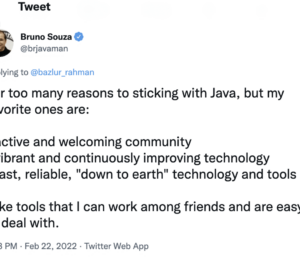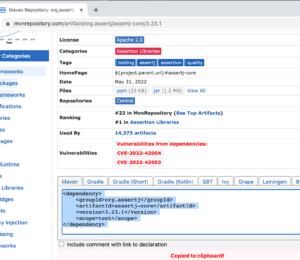More Foojay.io FOSDEM Speaker Predictions for 2023
- January 31, 2023
- 1845 Unique Views
- 4 min read
Following on from the first part in this series, covering Simon Ritter and several more, here is the next set of reflections on 2022 and expectations for this year, from speakers who will be in the Foojay.io developer room at FOSDEM on Sunday, 5 February.
What’s going to happen this year? In the software supply chain arena, it’s pretty clear that 2023 will be the year of SBOMs, Government legislation and (of course) a continued exponential increase in supply chain attacks.
Unfortunately, SBOMs are not the panacea everyone thinks they are, so 2023 will also be the year where we discover the realities of securing supply chains at scale and how both open-source communities and developers, in general, have a key role to play in this.
At FOSDEM I have a talk with Mikaël Barbero (Head of Security at Eclipse Foundation). We’ll be covering a little of what I’ve just said and explaining what the Foundation has planned to do to improve supply chain security for itself and its members and consumers.
There’s also a call to arms: everyone has a role to play in motivating or leading the Java community to tackle the challenges. I hope those there will help do their part, promote awareness, and/or take positive steps in making all our software safer and much harder to exploit.
— Steve Poole (Sonatype)
Apache Pulsar has taken enterprise event-driven messaging to a new level, unifying message streaming, queueing, mediation, and transformation all on the same platform and operating efficiently in cloud native environments.
Now you may want to know how you can avoid throwing away your functioning JMS/Jakarta EE messaging systems (systems that you might have spent much effort and time on previously), and still be able to leverage on Apache Pulsar for its powerful messaging and streaming capabilities particularly in the modern Cloud Native environment.
Let us show you how you can modernize your JMS messaging systems efficiently without having to deal with much complexity!
— Mary Grygleski and Enrico Olivelli (Datastax)
When I started experimenting with Java on the Raspberry Pi a few years ago, I didn't imagine I would end up with a book and speaking at conferences. It was my introduction to being a part of an OSS project (pi4j.com) and got me into contact with the amazing Java community. It was also the start of being a Foojay writer.
Although #JavaOnRaspberryPi is mainly used for experiments and is a "niche" project, it keeps evolving, and new people join and contribute new examples, documentation, and improvements.
At FOSDEM, I will take a look back at what happened in 2022 (e.g., SDKMAN, JBang, Vaadin, Kotlin) and what we can expect in 2023.
— Frank Delporte (Azul)
2022 was certainly an interesting year, with Covid still very much at the top of everyone’s mind at the start of the year as in-person events were being planned (and some being canceled, like Voxxed Days Brussels).
My first real in-person event after the pandemic was Voxxed Days Luxembourg where I spoke about how Quarkus makes Java relevant for Serverless workloads thanks to its super fast startup time and serverless container friendly extensions (e.g., Knative).
Speaking of Quarkus, it seems to be getting quite popular and I’ve been happy to see that many organizations I’ve talked to have started using it, and several of them have even proceeded to deploy critical Quarkus-based workloads into their production environments.
For 2023, I’m excited for the conference and meetup scene to really be coming back in full swing! In terms of the Quarkus world, we’ll see the adoption of Jakarta EE standards (javax to jakarta migration anyone?) in the release of Quarkus 3.0 and I’m sure there will be lots more cool features released that improve its developer experience even more.
Another project that’s near to my heart, Apache Camel, will also have a new major release with Camel 4 coming down the pipeline in a few months. Unsurprisingly, this is also due to the javax -> jakarta migration. This should be a fun year!
— Kevin Dubois (Red Hat)
In September 2022, Greg Lavender (CTO of Intel), hosted a keynote discussion with James Gosling, the creator of the Java programming language.
This discussion introduced several innovations and evolutionary topics, ranging from how an open ecosystem fosters sharable solutions to how Java can embrace heterogeneous hardware.
The outcome of this keynote was inspiring and revealed that many positive things are yet to come.
— Thanos Stratikopoulos (University of Manchester)
What has been the most interesting to me is the momentum around new technologies that allow Java to be a more viable option for Cloud deployments.
This includes JVM advances to improve start-up times (CRaC and InstantOn), and reduce memory footprint (JIT-as-a-Service).
And then there is native image AOT static compilation which is gaining in popularity and creating a whole ecosystem of frameworks and tools.
All of these innovations provide real solutions for Java developers who want to take advantage of cloud platform features such as microservices, serverless, and auto-scalers.
— Rich Hagarty (IBM)
I am working on bringing a new language — Fuzion — to the JVM platform.
But Fuzion also provides the possibility for other back ends that run without a JVM, where we could interact with a JVM only via JNI. So everything that has to do with inter-language operability is very exciting, project Panama greatly helps here!
Panama gives us many new options: we can run on the JVM and use Panama to interact with foreign code, but we could as well ourselves create native code for the Fuzion language and use Panama to interact with code in the JVM, hopefully reducing the JNI hassle and overhead to a minimum..
— Fridtjof Siebert (Tokiwa Software)
Don’t Forget to Share This Post!








Comments (0)
No comments yet. Be the first.